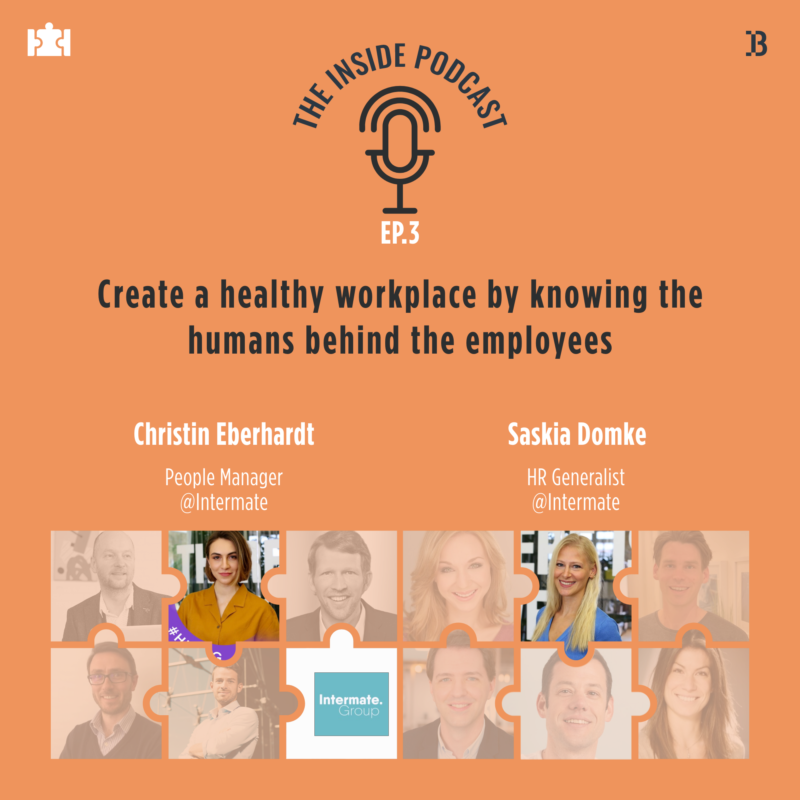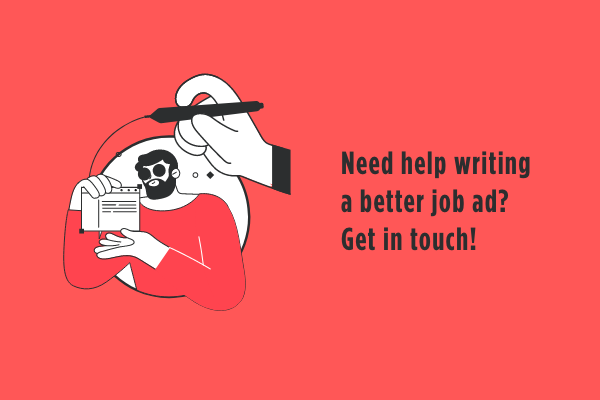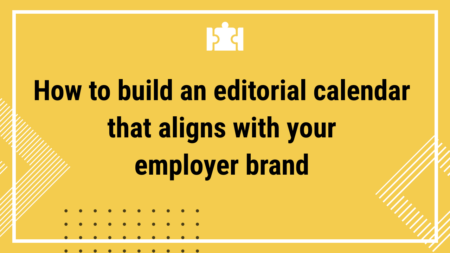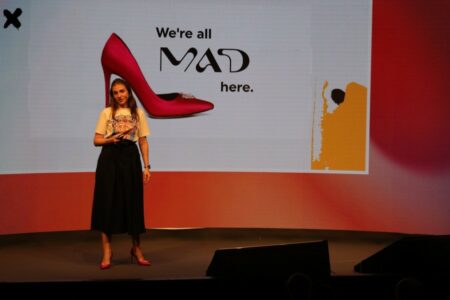Overview
Tune in for Ep.3 of Employer Branding: The Inside Podcast, Season 4! We spoke with Christin Eberhardt, People Manager, and Saskia Domke, HR Generalist, at Intermate – one of the largest social agencies in the DACH countries.
We talked about tips and tricks on scaling a company with culture in mind, but also about the importance of having honest company values and what roles they play in creating a healthy workplace. It turns out that getting to know the humans behind the employees is the key to building a strong employer brand.
What you’ll learn by listening
- Tips & tricks on company scaling with company culture in mind
- The importance company values & what role they play in preserving company culture
- A holistic approach to diversity in employer branding
- Building a strong employer brand: what channel suits best?
- The benefits of phone interviews in the initial recruiting phase
- Understanding the humans behind the employees, the key to building a connection
About the company
With over 110 employees and offices in Berlin, Hamburg, Cologne and Vienna, the Intermate.Group is one of the largest social agencies in DACH.
With its own production company Truemates, its own content studios, a holistic and proprietary influencer technology and the influencer and social agency Intermate, the group was able to establish a leading position in the social market with its strong focus on creators.
With a direct connection to the platforms and using its own technological infrastructure, the Intermate.Group offers the entire value chain on social media from a single source: influencer campaigns, creator-centric social media management, content production and performance ads.
With its own media inventory and its own formats, such as the TikTok show Daily Pie with over 900,000 followers or the VERTIES, the “Oscars” of the TikTok creators, the Intermate.Group can verifiably incorporate first-hand social expertise into the strategies and concepts of its customers. These now include companies and institutions such as o2 Telefónica, Beiersdorf, Volkswagen, the Federal Ministry of Health, ALDI Nord, HUAWEI and many more.
Enjoy listening to S04Ep.3 of Employer Branding: The Inside Podcast on Spotify!
Podcast transcription
Georgiana: Hi everyone. This is Georgiana with a new episode of Employer Branding: the Inside Podcast. Today, for the second time since I’ve started this podcast, I will talk to two people at the same time.
So I’m hoping we’ll have a very productive conversation within the three of us today. And my guests for today are Saskia Domke, from Intermate – Saskia works as a Human Resources generalist, and my second guest is Christin Eberhardt, from Intermate as well. And Christin is managing people and organizational development. Welcome!
Saskia Domke: Thank you so much, Georgiana. Thank you, we’re excited, and you ask very good and very deep dived questions. So I’m looking forward to finding out the answers.
Georgiana: Before we dive into company culture and leadership, I would like to ask you, first of all, what does Intermate us do? Exactly? I think it’s a really, really interesting business model that you guys have, and I’m sure people would like to learn more.
Saskia Domke: Sure. Christine, do you want me to start first?
Christin Eberhardt: Yeah, if you would like to share, I will add some information afterwards.
Saskia Domke: Exactly. Perfect. Yeah. So what can we tell you, hopefully, quickly about Intermate. So maybe we will start in 2014, when we were founded, which is quite some years already. We started off as a classic influencer marketing agency. What can you understand about an influencer marketing agency, it basically means that we work client based together with different clients, developing social media campaigns, together in collaboration with influencers.
And that has been and still is one of our main topics that we are working on. But as you know, social media is evolving super, super fast. And constantly. So of course, Intermate also, adapts to the needs. And we have been developing to a full service agency, we currently produce everything in house, we have our own production firm, it’s called Truemates.
We have our creative team who came up with all the concepts and the texts that we need for the campaigns. Of course, we have implemented a social ads team because influencer marketing without social advertisement these days, you can’t imagine anymore. And we also actually act from a creative perspective, meaning we have our own channels, mainly on TikTok, which really gives us the opportunity to see what is the view of a creator, what are the needs of a creator?
And yeah, what kind of videos, type of content is actually good for the audience? And that definitely benefits us in the way that we are working. And, yeah, also, of course, last but not least, we have our social media team, which is maybe a little spoiler, something that we are focusing a lot on in 2022, which we are trying to expand a little bit. Meaning of course, we not only have our clients that we are helping with the campaigns, we also take over the social media channels, have our clients mainly TikTok and Instagram and see what can we do to improve?
Maybe some key facts. So in total, we have over 100 employees now. We are located or have offices in three locations. So our headquarters are in Berlin. Our second largest office is in Hamburg and I think in general, I think it was January, we opened our third office in Cologne. So yeah, we are growing and we are developing from a very small agency to a really big one.
Georgiana: Yeah, okay. And since you guys were mentioning scaling the company and constantly hiring. I was wondering what has helped you most in the process of scaling the company when it comes to preserving company culture?
Christin Eberhardt: I think we still have to deal with this problem. So like, because right now we are around 100 employees, and I think that’s manageable, right? It’s quite manageable. And I think after COVID, when we maybe go back to the office, or more often, I think, then we will really feel that we are kind of having a pain or having problems like to really preserve the company culture, because many, many people haven’t seen each other, or see each other for the very first time.
We try to really make clear to employees that, in our onboarding or feedback meetings, everyone is a culture keeper. For instance, we have a system where we especially try to involve young employees and employees who are still kind of newbies. We try to involve them and share responsibility for how people act and feel within the company. And we make clear that everyone plays a significant role in shaping and passing on culture.
Christin Eberhardt
Saskia Domke: Yeah, as Christine has already mentioned, of course, I would say luckily, we haven’t faced the situation yet that we we had really to invent some measures to preserve the company culture, I think we have been growing quite organically, which means we didn’t grow from one day to the other.
And suddenly, we had 100 people, this was a process that was slowly going on. And we luckily had the chance to always inherit in some kind of way our company culture – that was kind of a given from day one. Of course, like any company, the bigger you grow, the more you have to make sure is it still the same culture as it has been on day one?
I think we really can say again, we were super lucky, we kind of naturally managed to kind of find out what it is that are our core values. What is it that we stand for, and as Christina was saying, it’s gonna be a surprise the day when we come back to the office all together to see if we are in the same scope, let’s say, we had before.
But of course, during this pandemic, and during the time working, basically 100% remotely, of course, we still tried to have some initiatives to keep the company culture alive. Meaning besides the onboarding, because we think and strongly believe in the beginning of an employee journey, so to say, when you join a new company, and especially if you do remotely, it’s super important to still be able to show what is the company standing for, what are the core values. And, you know, of course, smaller happenings, it might just be some online events, cool ideas that our culture team is coming up with, I think, definitely, it’s helping.
As a fun fact, actually, tonight, we are going to have a game with a company, Virgin Games. So we try to do things so that people get to know each other better. So you have an exchange, because we strongly believe that it’s super, super important to know your employees. Yeah, to be connected and to understand each other’s needs. And that, of course, is really important for shaping our culture and preserving it in the end.
Georgiana: And of course, I think the key word here is actually the employees, the colleagues that need to be kept in the loop all the time too. Be sure that you’re on the same page, like you said. And usually, the culture of a company is very much synonymous with that of the founders, especially for companies your size. Is this true for Intermate? What would you say?
Saskia Domke: Yes, I think so. We really had to laugh when reading this question because, yeah, in our case, we would definitely say yes. And our founders are all three very courageous and are not afraid to make mistakes and try new things. And yeah, they are curious and above all, very fast. And our dynamic and culture is quite fast and short lived. And, yeah, this is definitely reflected in our culture.
Georgiana: But it’s usually like that. And I guess, especially in digital marketing, or in marketing nowadays, it has to be dynamic, otherwise, there’s no other way. Right. And I was wondering, what do you guys think about company values? Are they important? Of course, they are important, but how?
Saskia Domke: Definitely, I think it depends a little bit on what context we are talking about, right? Like if we say company values are important for considering an employer brand, and that is what comes to my mind. First of all, I think definitely, yes. And 100%. I
What are the most important values to be a successful organization? I think the values are showing externally but also internally. Yeah, what kind of employer we are, and what kind of talent we want to attract, right? So they shaped the whole organization, in terms of decision making, behavior, measurement, and leadership, as well, of course, and helped people to identify with the company, which is the best branding you can have as an employer.
Saskia Domke
And I think in that regard, definitely a big, big yes, company values are super, super important, not just for the internal growth and identification, but also with the aspect of attracting new talent and to be present as an employer and maybe an attractive employer for potential new talents that we would like to hire.
Georgiana: Now, I would like to get a little bit into the topic of trends. It’s not necessarily the beginning of the year anymore, although it feels like that, in a way. One of the most important trends recently has been diversity, there’s been a lot of talk on diversity in 2022. How does Intermate look at this?
Saskia Domke: I think we both don’t really like the idea of diversity as a trend. So we think that diversity is a way bigger topic, but we understand that as well as sustainability, which many, many organizations, unfortunately, are using to brand themselves. And I think if the initial thought of diversity is not applied consistently, within every behavior and situation, the attempt to use diversity for one’s employer branding can backfire.
So one has to be very careful if one is branding oneself with this term diversity, and I also think it’s really crucial to have a consistent understanding of the term diversity. So what it looks like and how you want to apply it within your organization. So for example, we have a workplace manifest, which we want to implement and are partially already implementing. And this we explain in detail how we want people to behave and what our values are, and we have very clear rules and also do not tolerate intolerant behavior. So I think this is also crucial. And yeah, I think it’s really important to clearly communicate at the very beginning, what is diversity for us, what are our goals.
Georgiana: In the end, it’s, it’s important to stress, kindness and acceptance and tolerance without really pointing at diversity. Right?
Saskia Domke: Exactly. I think I can also just agree on that. And, as Christine mentioned, it’s, of course, very nice that diversity gets the attention, right? Because that is the overall goal, because we want to achieve that diversity doesn’t have to be a trend or a topic anymore, that it’s something that is just considered normal. But we still, of course, think it’s very important to have the controversy about diversity and to have it as a topic and to talk about it. And, of course, also for us, even though we kind of naturally try to, I would really say I think we are living in diversity, in a way.
Talking about a little bit of our perspective on social media that’s our home and our employees and the people we are trying to attract. They’re also living on social media. And you can see not only for employer branding, or recruiting, diversity is an important aspect. It’s kind of shaped all over social media, you can see that especially the younger generations, they are living diversity, they are asking for diversity. So yeah, I think you as a company, if you don’t have that yet, I think you should question yourself.
What are the barriers? And what can you do to overcome those barriers? And not, let’s say greenwash in a way, just by putting a nice picture on your homepage, on your career page, showing a diverse culture environment. I think it’s not easy for a company to switch it just like a light switch and to suddenly be a diverse company. Also, I think it’s very interesting to look at. Yeah, diversity from different perspectives. Well, are we talking about cultural diversity or cognitive diversity, which is something that I personally am very passionate about? So yeah, cognitive diversity, different perspectives – looking at problems from different directions, which can help to solve the issues.
Georgiana: Yeah, yeah, exactly. And you know what, in the end, I’m not so sure about the definitions, because I haven’t really researched the topic. But I would like it if people in companies and not necessarily older generations, but you’re saying that the younger ones are living diversity, or are breathing diversity, whereas the older ones aren’t.
And the way I like to look at diversity is people who have not necessarily worked in this area, you know, when, when your recruiter tries to consider other people, aside from the ones that you usually consider. People who are over 40 or 50 years, or even 60 in some way. So to me, in the end, diversity is just sort of widening your horizons when it comes to your pool of candidates, and trying to accept that people can be different and still succeed at what they do, you know?
Christin Eberhardt: I think especially the recruitment process is maybe a point where you can implement many diversity measures or try to not be as biased as possible. I mean, everyone has biases, and our brain works like that. Without having categories or building fast categories, our brain isn’t working, but knowing that, I think it’s really important to find processes where you don’t feel those biases. For example, we try to keep our first interviews via phone, so we stick to phone calls.
Many people ask if we can also FaceTime or do a video call. But the very first call, I think, is so special, because you’re really listening to the things people are saying and you’re not distracted by the faces or the logic or the things you’re seeing on the screen. So I really, really like phone interviews and we should preserve that and keep it that way because yeah, you can kind of avoid being too biased.
Georgiana: Exactly exactly. How are you guys involved in getting to know the people, understand their needs and wants?
Saskia Domke: I think, as I was mentioning earlier, it’s very, very important to get to know your people. I mean, of course, very much depending on the size of the company, if you have hundreds of employees, I guess it’s kind of hard as a founder or a managing director of the company to know everyone.
But we are lucky that Christine and I, as HR people, we know everyone, because we participate in every feedback, we really take initiatives to get to know the people. And yeah, one example we can give is about our feedback process that we have from the beginning. We keep in touch, every month, the first month, after three months, after six months, we are constantly in an exchange to understand what people are feeling, what is their well being, I think this is extremely important.
And we strongly believe that it’s kind of a necessity to understand the needs, and to act accordingly to the needs. And of course, also, this is a part where our leadership, leaders are taking the responsibility over because they are the ones that are working very, very closely with our employees. And especially then we see it’s their task to know their direct reports, and also to maybe have the empathy to understand how they can talk with them and in what way they need support and how they need direction and in what way they need their freedom.
Saskia Domke
Christin Eberhardt: With Saskia saying that, especially in our very first feedback meeting, after an employee has started, we focus, exclusively, on exchanging private information and really getting to know a person. So we have developed for this purpose, a few questions which are asking, yes, especially about private matters, or preferences. So, for example, what does a perfect working day look like for you? Or what is your worst day? Or how can people talk to you for about four hours? So if one is quite shy, how can I interact with you? And how can I get you into the group, with which topic or what is your preferred feedback channel?
Georgiana: Yeah, these are really, really useful points. And also, I was wondering, since you guys are in the area of marketing and social media, what social channel would you say is the best for building a good employer brand?
Saskia Domke: That’s a very good question. Because I think, even for us in the field of marketing, it means experimenting a lot and taking our experiences and seeing what is working best. We can be kind of proud that this is working for us, in a way, we get a lot of people through our employees. So we have a really, really strong network, and people working for us, apparently, are really happy, which is really good so that they recommend us to their previous colleagues or friends. And this is a way that is really working well for us. So we at least can see that our internal branding and the values and culture we share is understood by everyone and everyone can identify. But of course, to the outside world, we also tried a lot of different things.
I think we are very present on all the typical channels. And particularly actually, we noticed that lately TikTok is really working well for us. We have some colleagues who take the time and record some nice videos about our virtual working environment and of course we are using trends and I think most importantly is that we don’t take ourselves too seriously. We can laugh about cliches, especially agency cliches. I think everyone that works in an agency environment knows there’s a lot of jokes. Exactly. So we yeah, we are taking this as a fun thing and making a nice video about it.
And we can see that this is really crushing. That’s, that’s super nice. Like, we have 1000s of views on those videos, even though we are just using this, you know, as fun. It’s a good, good thing for us because we really noticed we are having people applying saying, Hey, I just saw your video on TikTok, and it looks kind of funny. And I thought, hey, I’m checking you out. And, and this way, we didn’t even really put an effort there. But it works in a nice way. And other than that, I think the classic channels, like LinkedIn, of course, we have a presence there. And we are sharing things we are doing and trends that we are discovering. That is working very well for us, too.
I don’t think I would emphasize TokTok here, because I think TikTok offers a channel to really authentically present culture, how it really looks on the inside and how people behave. If you think back, I think 10 years ago, you always saw the same job and career pages with stock photos, and everything looks so polished and perfect and not really representing how it really looks inside. And I think TikTok is way more entertaining, and you can play with cliches and stereotypes and use it for your advantage, and yet show a completely different side of your company and culture. So I think this could be a really, really interesting channel to look at.
And, yeah, I would also emphasize that employee referrals are super crucial for us. Because if you think about it, every one of us has, I think, at least five really close friends. And what are the topics you’re talking about with your close friends? Always work, always maybe have some hobbies and relationships. And so everyone has a huge network. And if you talk positively about your employer, and then maybe your friend is talking to another friend and saying, Oh, I’ve heard you work in Marketing, and you’re unhappy, you know what, I have a friend and this friend is super happy and also working in marketing. So I think this is kind of a hidden channel and maybe a channel which many people aren’t really thinking of or not considering and think this is a good channel to reevaluate.
Georgiana: I would have had some more questions. But unfortunately, we need to draw our conclusions. So I will ask you for some resources that have been very helpful to you in your career so far.
Saskia Domke: This is a very good question, I think. Network again. So for me personally, it was extremely helpful to work in a recruiting agency as a first step, because I had the chance to meet many, many clients and companies and different people or recruiters and to expand my network at a very early age. So yeah, therefore, I would recommend creating accounts on business platforms, get connected, follow topics and yeah, maybe people you are really interested in or that kind of inspire you. Also on business platforms like LinkedIn, you have so many free webinars. So I think this is a really good career pusher, if you want to say it like that.
Yeah. I think I can definitely agree with what Christine has shared. Maybe on top of that, if I’m thinking of myself, I think it’s important to always stay curious and to not hesitate to ask questions. And in that way, be bold and continue asking those questions until you get the answers that you’re looking for, and speaking openly with your friends and with your network. I think especially maybe now, from a very female perspective, we all know that it is a more common thing to have this mentoring circle, within men. So my friends, and I, we, we started talking way more about business related topics, and we are not all working in the same field, we are working in very different branches. But yeah, we were facing similar issues. And I think it’s super, super helpful to exchange and to talk to people about potential things. Also, in terms of what are things that you can expect, and what you can actually ask for. And don’t be hesitant and shy in that regard. Also, don’t, don’t make yourself small. Always be present.
Georgiana: Absolutely. Well, I wish you good luck. This has been real fun. A very, very productive discussion in three. I will repeat the format. And I hope we can meet in person one day.
Saskia Domke: I hope so. Yeah. Thank you so much for your time and your interest and it was very fun talking. Thank you for the stage. Bye, bye.
This was Employer Branding: The Inside Podcast. You can find our podcasts on Spotify on Apple podcasts and content on employer branding-related things on employerbranding.tech. Until the next time, stay tuned.







